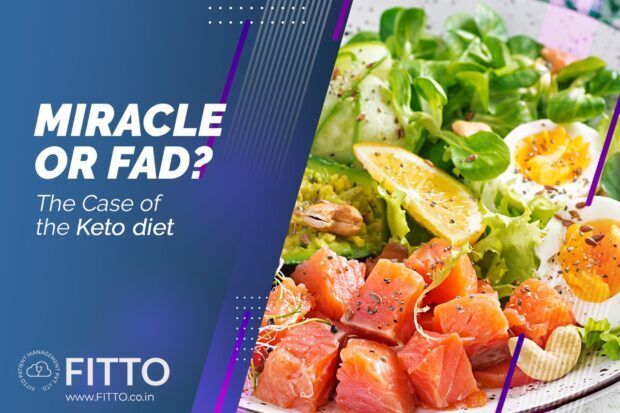Miracle or Fad? The Case For and Against Keto
Every millennial is talking about the infamous ketogenic diet. You probably have a few friends or family doing it right now. But what does it actually mean to be on keto? Simply put, the keto diet is a high fat, moderate-protein, and low-carb diet similar to the Atkins diet, which can provide miraculous results regarding weight loss. It works on the principle of removing carbs and replacing it with fat to induce a process called ketosis, by which fatty acids or ketones are burnt. However, it also requires cutting out very important food groups for a certain period of time. Some foods to avoid on keto include grains, beans, added sugars, low-fat dairy products, and starchy vegetables. The discourse on this topic has been long and extensive, people seem to love it or hate it in equal measure of intensity. So we at FITTO want to discuss this diet from a medical perspective, and help fitness enthusiasts at home make an informed decision.
Why You Should Try Keto:
- Weight Loss: There has been some anecdotal evidence to suggest that keto helps with weight loss. Cutting out food groups can significantly reduce caloric intake. Practitioners also report feeling less hungry on the diet, as they are consuming fats which take much longer to digest than carbs.
- Beneficial for Certain People: Athletes and bodybuilders seem to benefit the most from this diet, as it works to reduce fat within a short time frame. However, studies show that keto can help reduce seizures in epileptic paediatric patients. There is also ongoing research regarding keto’s benefits for people with progressive neurological diseases such as Parkinson’s.
- High-Fat Calorie Loss: The fact that one can reduce weight by eating fatty foods is what attracts so many people to the ketogenic diet. Normally, we are told to stick to low-calorie foods while trying to lose weight, but keto encourages the consumption of enjoyable high fat foods like cheese, red meat, nuts, fatty fish, and butter.
The Problems With Keto:
- Lack of Calories and Nutrients: Since keto requires cutting out some very important food groups, it is only natural that your body will experience a loss in important nutrients such as vitamins, minerals, and fibre. Not consuming any carbs can result in constipation, a problem faced by many keto practitioners due to lack of fibre. The diet’s deficiencies also cause a condition called “keto flu”, which results in fogginess and tiredness.
- Bad Fats and Renal Risk: Most cardiologists recommend only upto 6% of saturated fat in the diet. Consuming high fat foods regularly can impact heart health over time, putting you at serious risk for cardiovascular disease. Additional ketones in the diet also increase the load on your kidneys. Dehydration seems to be a pretty common side effect as well, since keto removes the water-friendly nutrient glycogen from the bloodstream.
- Difficult to Stick to: The stricter the diet, the harder it is to sustain long-term. Keto requires eliminating carbs in favour of meat and fat, which is quite the task for a typical Indian diet. This greatly limits food options, as most Indians are vegetarian. It is also termed as a “yo-yo diet”, since it only encourages weight loss when you’re practising. As soon as you stop, so does the process of ketosis, following which your risk for regaining all the lost weight goes up.
While keto can give great short term results, it is not encouraged for sustained, long-term practice. But don’t worry, there are several other achievable methods of losing weight. Many nutritionists and doctors suggest that if keto doesn’t work, one can try the Mediterranean diet, Blue Zone diet, or Intermittent fasting with a varied, balanced diet to shed that extra fat. Not to mention, exercise and stress management are crucial for staying slim and healthy. So be sure to consult a dietitian before making any changes to your lifestyle, and keep all of this in mind next time you’re tempted to try a new internet diet.
References:
https://www.nm.org/healthbeat/healthy-tips/nutrition/pros-and-cons-of-ketogenic-diet
About the Author








